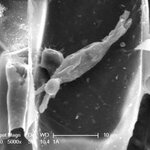
The latest outbreak of Ebola virus disease that has claimed more than 1,000 lives in West Africa and poses a serious, ongoing threat to that region: the spread to capital cities and Nigeria —Africa's most populous nation — presents challenges for health care professionals.
The situation has garnered significant attention and fear around the world, but proven public health measures and sharpened clinical vigilance will contain the epidemic and thwart a global spread, according to a new commentary by Anthony S. Fauci, M.D., director of the National Institute of Allergy and Infectious…




